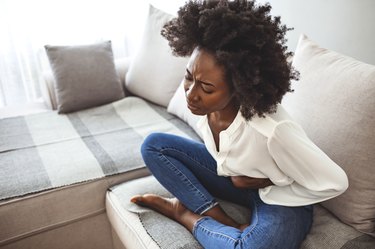
If you feel like your stomach is burning up inside, you're not alone. Burning, gnawing stomach pain is common, though that doesn't make it any less uncomfortable. Symptoms and causes vary, but isolated episodes of stomach burning are rarely cause for alarm. The most common culprit is excess gas.
Why the Pain?
Video of the Day
Though gas is most often the cause, your pain could be related to indigestion, a stomach ulcer or even gastroesophageal reflux disease (GERD).
Video of the Day
Tieraona Low Dog, MD, a Pecos, New Mexico-based expert in integrative medicine, says it may make sense to check with a pro. "If your gas is accompanied by blood in your stool, weight loss or unexplained fatigue, or does not improve with home remedies or dietary changes, you should mention this to your health professional to rule out anything more serious," she says.
The National Institute of Diabetes and Digestive and Kidney Diseases reports that most people pass gas 13 to 21 times a day. The trouble begins when excess gas doesn't move fast enough. Trapped in your intestines, it can cause shooting pains or burning sensations in your belly.
The good news is that gas is easily treatable. "Limit carbonated liquids, don't drink through straws or chew gum and eat slowly to reduce swallowing air, which can lead to gas, [and] exercise regularly," Dr. Low Dog says.
Other Causes of Stomach Burning
If you're feeling the burn daily, your stomach issues could indicate an underlying condition. Dyspepsia, GERD and other digestion-related medical diagnoses can cause painful burning sensations. Burning from dyspepsia occurs at the top of your stomach, says NIDDK, while people with GERD feel that burning sensation in the middle of their chest, the Institute adds.
Dyspepsia is a type of chronic indigestion that isn't caused by an ulcer. According to the Mayo Clinic, its cause is unclear, but factors such as age and anxiety or depression could raise your risk.
If GERD is the culprit, the burning you feel comes from acid and food that sometimes bubbles back up into your esophagus from your stomach. According to the National Institutes of Health, GERD affects about 20 percent of Americans at some point in their lives.
Dyspepsia and GERD "can be brought on by stress, lack of sleep and poor eating habits," says Vicki Shanta Retelny, RDN, a Chicago-based dietitian-nutritionist. "Foods that are highly processed and contain a lot of saturated fat, sodium and sugar can wreak havoc on your gastrointestinal tract over the long term."
Read more: GERD: Its Signs and Symptoms
When IBS Causes Burning
Irritable bowel syndrome (IBS) can manifest in different ways, but "typically there is gas, bloating and abdominal pain," Shanta Retelny explains.
While dyspepsia and GERD often cause a burning sensation near the top of your stomach — and sometimes in your throat — IBS causes turmoil in your intestines. If you have IBS, the roiling, burning discomfort will originate from the bottom of your abdomen rather than the top.
Consult with your doctor if you think your chronic stomach burning could be a result of IBS. A variety of treatments are available, from lifestyle changes to elimination diets to medications.
Burning stomach pain can also be a symptom of stomach cancer. According to the American Cancer Society, "symptoms of stomach cancer often do not appear until the disease is advanced." Signs can include belly pain, nausea, bloody stool, and yes, burning stomach pains.
But don't panic: Burning stomach pain is much more likely to be the result of gas, GERD, dyspepsia or IBS.
Treating Pain From Gas or Indigestion
If your stomach burning is due to indigestion or gas caused by something you ate, the pain will pass in time, but there are a few things you can do to alleviate it.
"There is a class of herbs called carminatives, which dispel gas and ease abdominal bloating, such as fennel, anise, caraway, cardamom, peppermint and ginger, to name just a few," Dr. Low Dog says.
(A word of caution for people with acid reflux: Certain foods, such as carminatives, may relax the lower esophageal sphincter, according to a July 2015 clinical review in Annals of Internal Medicine. That's the band of muscle that keeps stomach acid from washing back up your esophagus. If you have gastroesophageal reflux disease, avoid peppermint and spearmint, says the U.S. National Library of Medicine.)
For acute stomach burning, Shanta Retelny offers this advice: "Sometimes not consuming anything or just sipping plain water is best."
Read more: Does Drinking Water Reduce Bloating?
- Tieraona Low Dog, MD, integrative medicine specialist, Pecos, New Mexico
- Vicki Shanta Retelny, RDN, dietitian-nutritionist, Chicago
- National Institute of Diabetes and Digestive and Kidney Diseases: “Symptoms & Causes of Gas in the Digestive Tract”
- Mayo Clinic: “Functional Dyspepsia”
- National Institutes of Health News in Health: “Feeling the Burn? Options for Acid Reflux”
- American Cancer Society: “Signs and Symptoms of Stomach Cancer”
- NIDDK: "Symptoms and Causes of Indigestion"
- NIDDK: "Symptoms and Causes of GER and GERD"
- Annals of Internal Medicine: "Gastroesophageal Reflux Disease"
- U.S. National Library of Medicine: "Gastroesophageal Reflux - Discharge"
Is this an emergency? If you are experiencing serious medical symptoms, please see the National Library of Medicine’s list of signs you need emergency medical attention or call 911.